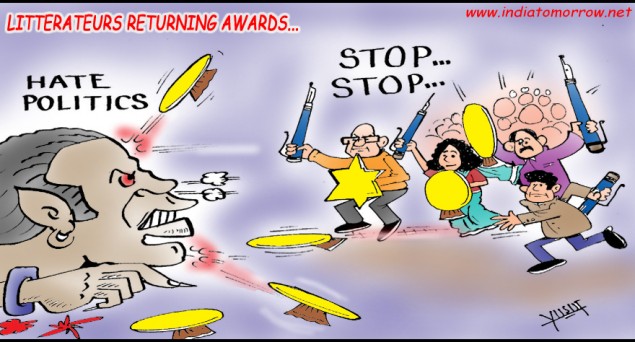By Taha Amin Mazumder,
Yesterday was a Sunday, the day to relax, but writers in India did not choose to relax, and about eight of them returned their awards on a single day in protest against the totality of the disturbing events occurring in the country one after another, which probably never happened in the history of Indian literature. So far, more than a dozen of Indian top writers — right from Nayantara Sahgal to Surjit Patar — all returned their Akademy awards. Three rationalist writers were butchered in the country by fanatics within months, and no significant actions have been taken against the killers so far — another unprecedented chain of events that compelled the conscientious Indian writers to return their honors against the reign of fear.
Incidentally on the same day, talking about the infamous 1975 Emergency that had been imposed to gag the freedom of speech, Indian Prime Minister Narendra Modi said, “Emergency should be remembered not to cry or brood over what had happened then, but to strengthen our resolve to fortify and further strengthen the democratic values and framework in our country.”
The PM’s reminder, or remark, is laudable, but what about the recent Indian hashtags of communal intolerance, the attempts to permanently gag rational voices, the banning imposed on people’s eating habits or the brutal lynching associated with them? Do not these events, viewed all together, make the impression of an undeclared emergency, when right from the parliamentarians to the fringe state leaders of the ruling party, to the splinter groups of its ideological mentor, all are favoring banning — from films referring to cuss or controversial words to meat or beef, to books? Or will it be wrong to say that the writers’ protests, by returning their awards against this pan-Indian banning spree coupled with the attempts to suffocate the sane voices, is the declaration of a reverse emergency in protest?
When the government, in fact the prime minister, keeps mum on the absolute communal behavior of the ruling party leaders, or it does not declare an emergency but let an emergency situation spring up, the writers have probably resorted to make the emergency obvious now in their leeway through a literary uprising or a reverse emergency by reversing their government-awarded honors.
It may sound clichéd to call the literature the mirror of the society once again, but the truth is — it is, has always been, and will be. Herta Muller, German novelist, poet and essayist, said while accepting her 2009 Nobel Prize in Literature “what was happening could no longer be expressed in speech. At most the external accompaniments, but not the totality of the events themselves. That I could only spell out in my head, voicelessly, within the vicious circle of the words during the act of writing. I reacted to the deathly fear with a thirst for life. A hunger for words. Nothing but the whirl of words could grasp my condition. It spelled out what the mouth could not pronounce. I chased after the events, caught up in the words and their devilish circling, until something emerged I had never known before.”
When “the whirl of words” makes an impact and the society revolts positively, a writer’s only task remains is to let the words “take possession” of him or her. They do not need to make a bang by returning their awards that are conferred to them solely because their words matter in the society, or reflect it as the mirror.
But when they are killed for their words by a frenzied mob that does not believe in the power of words but in the barrel of guns, the only way to retort for them remains in returning the awards that were given for their contributions to change this mob.
So in the “pantomime” of a paranoid society — where rationalists are killed, bans are imposed one after another and people are lynched for their personal beliefs or eating habits — Indian writers have laudably taken a leeway of protesting, by creating an aura of reverse emergency, which maybe the former prime minister Atal Bihari Vajpayee could get in an easier manner than Narendra Modi, who is undoubtedly a good speaker or crowd puller, but sometimes keeps chosen silence, which “like a cancer grows,” unlike Vajpayee who had to remind Modi of “Raj Dharma” in 2002. Unfortunately, there is no Vajpayee to remind him of the Raj Dharma this time.
Who knows how many writers need to return their awards and how many are to be “killed” before India ushers in another “dawn of history” by learning the way of peace. By then, as PM Modi remembers the 1975 Emergency but keeps mum on attacks on the freedom of speech, the writers will probably continue their literary uprising against the undeclared emergency.





